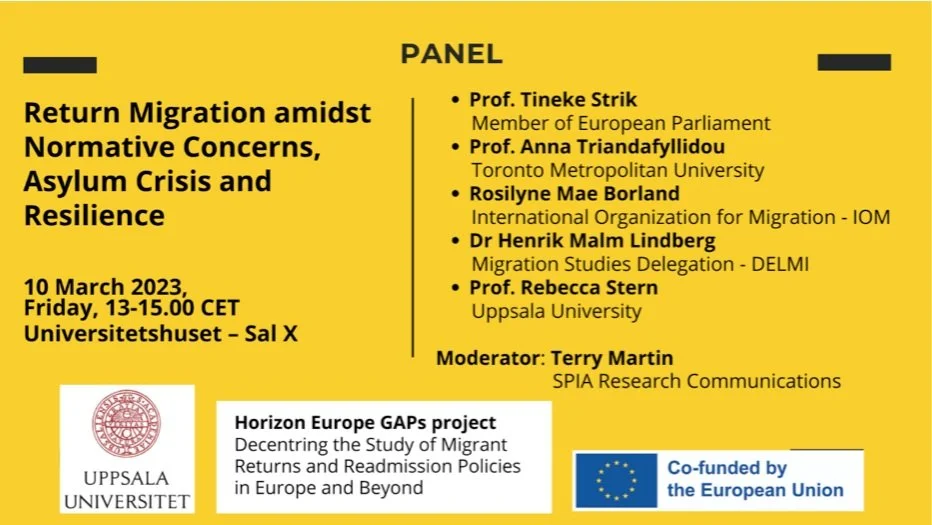Panel: “Return Migration amidst Normative Concerns, Asylum Crisis and Resilience”
by: Soner Barthoma, Uppsala University | Zeynep Mencütek, BICC
GAPs first panel took place at University House, Uppsala University and was moderated by SPIA director, Terry Martin. Two of the panellists were present – Prof. Tineke Strik (Member of European Parliament) and Prof. Rebecca Stern (Uppsala University). Two panellists participated online: Prof. Anna Triandafyllidou (Toronto Metropolitan University) and Rosilyne Mae Borland (IOM).
The panel opened with a welcome address by the Vice Rector of Uppsala University, Tora Holmberg. The coordinators then presented the GAPs project.
The panelists' contributions were structured around four thematic blocks:
1. Overview of current migration patterns (in historical context), major drivers of migration today (crises), countries experiencing significant migration and how these relate to policies and return policies.
2. The legal dimension of return (international law, how states work within or around it), human rights and humanitarian concerns (normative perspectives).
3. Migrants' human agency and resilience. How do they acquire agency, exercise it, to what effect?
4. Future trends. Current projections for migrant return policies. Potential impact of emerging crises (geopolitical, economic, climate/environmental), advocacy efforts, political pressures. And: knowledge gaps that need to be addressed.
The panel discussion showed how the issue of return has been politicised in recent years as one of the main narratives of migration policy, in line with the EU's externalisation of migration policy. Migration has moved to the centre of the debate, especially in relation to legislation and the growing discourse of 'doing more'. However, the complexity of migration and the need to address individual needs and trajectories in policy design and implementation was underlined. They pointed out that the reasons for return are as diverse as the drivers of migration. Accordingly, speakers also highlighted different meanings of return, highlighted gaps in legal frameworks and pointed to different scenarios related to return policies. One example discussed in relation to return was the recent 'Stop the boats' campaign in the UK. Our consortium member and Member of the European Parliament, Prof. Strik, explained the changes in EU policies related to return and readmission policies. The panel concluded that the current debate on return is not evidence-based and that GAPs aims to contribute to the collection of research evidence from different stakeholders. They underlined how the GAPs research project could "influence knowledge, policy and public awareness".
Contact:
Soner Barthoma | Uppsala University | soner.barthoma@crs.uu.se
Zeynep Mencütek | Bonn International Centre for Conflict Studies | zeynep.mencutek@bicc.de
You may want to take a look at these content, too?
Migration Matters Screening at GAPs Kick-Off
Migration Matters Screening at GAPs Kick-Off
From March 8-10, 2023, the “GAPs: Decentring the Study of Migrant Returns and Readmission Policies in Europe and Beyond” project consortium met in person at the University of Uppsala in Sweden to kick off an ambitious three year Horizon Europe research project. In addition to meetings on individual work packages, project objectives and management, dissemination, and ethics and data management, the meeting was enriched by several content-based events. One of these events was a film screening and discussion…
story of one returnee from the UAE to Kerala, India
Story of One Returnee
One of the events of GAPs kick-off meeting was a film screening and discussion on the potential and challenges of digital storytelling for shifting migration narratives and informing research-based policy together with academics and migrants.
The second part of the meetıng focused on documentary storytelling from the international project Migrant Lives in Pandemic Times, featuring the stories of a diverse range of migrants around the world and how their lives were impacted by the pandemic in terms of work, family, mental and physical health, and community. This cluster included the story of one returnee[1] from the UAE to Kerala, India. The screened videos represented a mix of in-person productions and remote productions during Covid and were produced for diverse target groups, ranging from youth and university-level students to policy makers.



